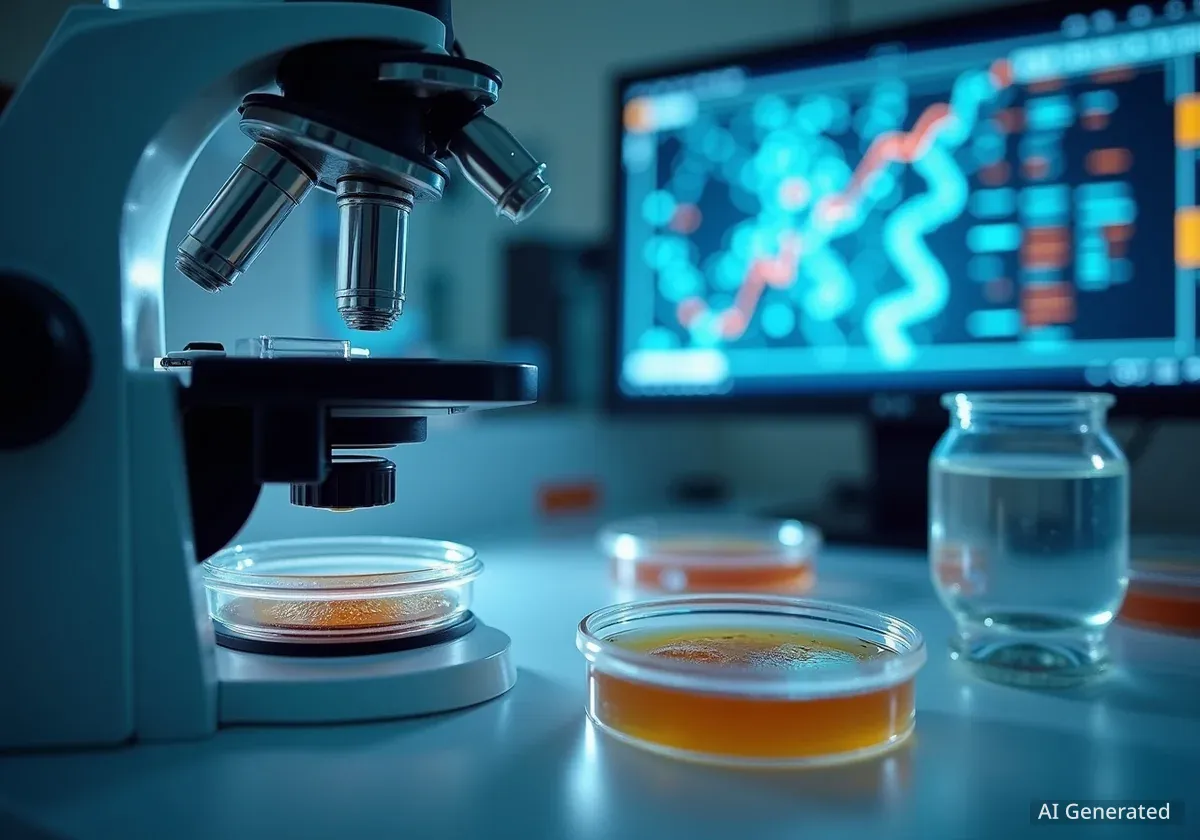Anthropic has launched a specialized suite of artificial intelligence tools named Claude for Life Sciences, designed to accelerate research and development in the biomedical field. The initiative aims to support scientists throughout the entire discovery process, from initial research to commercialization, by enhancing its AI model and integrating it with key scientific platforms.
The new offering is centered around Claude Sonnet 4.5, an upgraded AI model that demonstrates improved performance on scientific tasks. This move signals a deeper push by AI companies to create specialized tools for complex, high-value industries like pharmaceuticals and biotechnology.
Key Takeaways
- Anthropic released "Claude for Life Sciences," a set of AI tools tailored for biomedical research and development.
- The new Claude Sonnet 4.5 model shows performance on scientific benchmarks that surpasses previous versions and, in some cases, human baselines.
- New integrations, called connectors, link Claude directly to scientific platforms like PubMed, Benchling, and BioRender.
- A feature called "Agent Skills" allows the AI to follow specific, repeatable laboratory protocols and procedures.
A More Capable AI Research Partner
At the core of the new initiative is the improved performance of Anthropic's latest model, Claude Sonnet 4.5. The company reports significant gains in the model's ability to handle tasks specific to life sciences.
To measure this improvement, the model was tested on various benchmarks. On Protocol QA, a test that evaluates understanding of laboratory protocols, Sonnet 4.5 achieved a score of 0.83. This figure is higher than the human baseline score of 0.79 and an improvement over the previous model's 0.74 score.
According to Anthropic's data, the Claude Sonnet 4.5 model not only outperforms its predecessor but also exceeds the average human performance on specific laboratory protocol comprehension tests.
Similar performance enhancements were noted on BixBench, an evaluation focused on bioinformatics tasks. These improvements are intended to make the AI a more reliable assistant for scientists dealing with complex data and procedures.
Connecting AI to the Lab Bench
A significant part of the announcement is the introduction of new connectors that allow Claude to interact directly with established scientific tools and databases. This integration is designed to streamline workflows and bring AI capabilities into existing research environments.
The new connectors include widely used platforms in the life sciences community:
- PubMed: Provides access to millions of biomedical research articles.
- Benchling: Enables Claude to reference specific experiments and notebooks.
- BioRender: Connects the AI to a library of scientific figures and templates.
- 10x Genomics: Allows researchers to perform single-cell and spatial analysis using natural language commands.
- Scholar Gateway by Wiley: Offers access to peer-reviewed scientific content.
These specialized tools join existing general-purpose connectors for platforms like Google Workspace and Microsoft SharePoint, further embedding the AI into daily research operations. Sarah Nam, VP of AI Strategy and Partnerships at AbbVie, commented on the impact of such integrations. "By integrating Claude across workflows on AWS, we improve efficiency and interactions, accelerating our mission to deliver innovative medicines to patients worldwide," she said.
Automating Protocols with Agent Skills
Anthropic also introduced a feature called Agent Skills, which enables Claude to perform specific, multi-step tasks by following predefined instructions and protocols. This is particularly relevant for scientific work, where consistency and adherence to procedure are critical.
An initial skill has been developed for quality control on single-cell RNA sequencing data, a common but detailed task in genomics. The skill, named `single-cell-rna-qc`, is designed to follow best practices for filtering and preparing this type of complex data.
"Claude, paired with internal knowledge libraries, is integral to Sanofi's AI transformation... We're seeing efficiency gains across the value-chain, while our enterprise deployment has enhanced how teams work. This collaboration with Anthropic augments human expertise to deliver life-changing medicines faster to patients worldwide."
Researchers also have the ability to create their own custom skills, allowing them to automate unique or proprietary procedures within their labs. This feature aims to move the AI from a general-purpose assistant to a specialized tool that can execute specific scientific workflows reliably.
Industry Adoption and Early Use Cases
Several major pharmaceutical companies and research institutions are already using Claude in their operations. The applications range from accelerating drug discovery to streamlining regulatory compliance.
For example, researchers can use the AI for comprehensive literature reviews, generating testable hypotheses from vast amounts of published papers. With the new connectors, it can also draft study protocols, create standard operating procedures, and assist with bioinformatics data analysis.
Supporting Open Science
Alongside its commercial offerings, Anthropic is continuing its AI for Science program. This initiative provides free API credits to researchers working on high-impact scientific projects, aiming to foster innovation and help scientists address pressing questions in their fields.
The Broad Institute of MIT and Harvard is working with the AI to help scientists explore data at a new scale. "AI agents built on Claude enable scientists to work at entirely new scale and efficiency, exploring scientific domains in previously impossible ways," said Heather Jankins, Head of Data Science Platform at the institute.
Other industry leaders have also noted the potential impact. Hisham Hamadeh, a Senior Vice President at Genmab, stated, "We see tremendous potential in Claude streamlining how we bring drugs to market. The ability to pull from clinical data sources and create GxP-compliant outputs will help us bring life-changing cancer therapies to patients faster."
The Claude for Life Sciences tools are available through Anthropic's website and on the AWS Marketplace, with availability on the Google Cloud Marketplace expected soon. The company is also providing dedicated support from subject matter experts to help organizations implement the technology.





